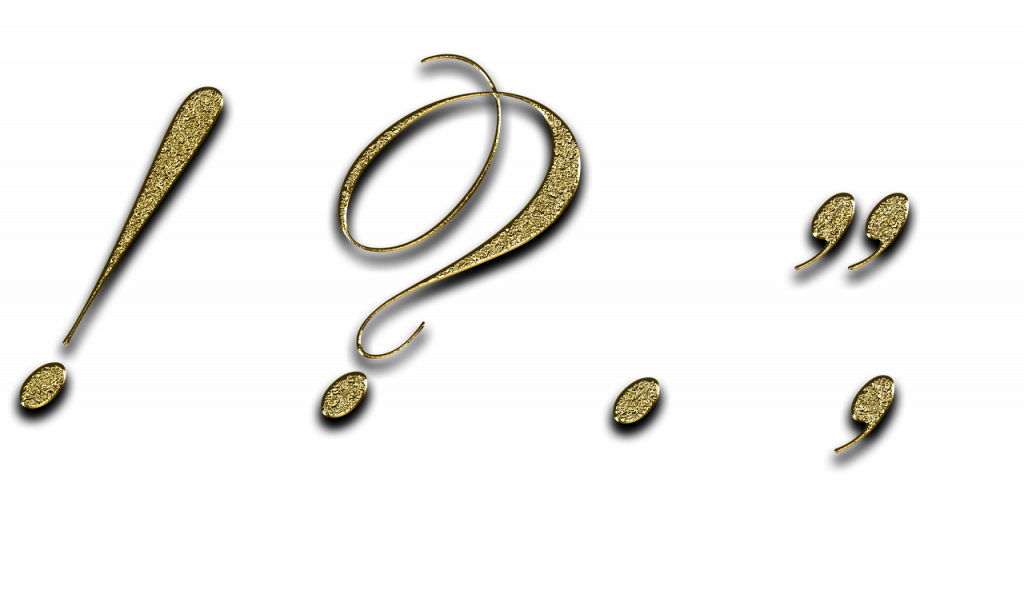English Punctuation Failures Posted by Gary Locke on Feb 4, 2019 in English Grammar, English Language
We really don’t devote as much space in this blog to the little things. And by little things I mean periods, commas, quotation marks, question marks, and exclamation marks. Yet, we use those little dashes, dots, and curlicues every day. I didn’t even mention the ellipsis marks, parenthesis, colons, and semi-colons (there’s a reason for that, which I’ll get to later). Why does English punctuation vex us so much?
Question Marks
Let me give one perfect example of a common punctuation mistake that I see at least once a week. What’s wrong with this headline?
How to Use Punctuation?
If you guessed that the question mark doesn’t belong, you would be correct. The person who wrote that headline assumed that any sentence which begins with the word How must be a question. There is a general rule in English that some select words are question words: who, what, when, where, why, and how. Therefore, it is understandable to assume that any statement which begins with those words is a question. Context tells us that this is a statement, the title of an article which will help us to improve our punctuation.
Here’s a similar example:
Why Temperatures Are Colder Than Usual?
The placement of certain words is a clue that this is not a question, but rather a statement. It is declarative, as if to say, “This is why temperatures are colder than usual.” Questions always ask for a response. Shift just one word and you have a proper question: Why Are Temperatures Colder Than Usual?
Excalmation Marks
Sometimes punctuation fails due to overuse. Consider our friend the exclamation mark. We use it for emphasis, to draw attention to what is being stated. “I’m having a great morning!” “My sister just had a baby!” But you can’t use an exclamation mark for everything, or too repetitively, because the effect is lost. You would dilute the purpose for using it. “Good morning! It’s Friday! We’re going to have a great weekend!” Ugh. It’s the equivalent of writing in all caps on social media. STOP SHOUTING! The only thing that needs to be that excited about everything is a golden retriever puppy.
The proper way to use an exclamation mark is sparingly. For the first 30 years or so of their history, comic books always ended each sentence with an exclamation mark. This wasn’t because Superman and Batman were always excited about something, or because they were hearing impaired. The quality of the print was so bad in those early books that readers couldn’t see periods or commas, but exclamation marks were big enough to be easily visible. It was a way to tell when one sentence ended, and another began. Once printing and paper quality improved, publishers couldn’t wait to abandon the exclamation mark rule.
Commas
Commas are also frequently overused, even if they are used properly. Commas are vital to good writing. They make the sentence as clear and unambiguous as possible. If you have been paying attention, you will also notice that I use what’s known as the Oxford comma, or the serial comma. It is an optional comma, used at the end of a list of three or more things. “I like baseball, classical music, and old movies.” The Oxford comma is rarely necessary to clarify the intent of the statement, but it can be sometimes. If you always use the Oxford comma, then you will never have to wonder when you should use it.
Comma overload comes when writers believe that a long sentence makes sense just because there are commas to separate clause, predicates, and phrases. Let me assure you that every long sentence would benefit more by brevity than by perfectly placed commas.
Consider this:
“I’ve been laid up this week with a swollen knee, and some terrible pain, which I initially injured it as I wandered the rainy, cold streets around Capitol Medical Center, the local hospital where my late, much-beloved mother, worked for many years.”
Whew! There is nothing technically wrong with that sentence. It is also ugly. To improve it, the sentence should be fragmented into several sentences.
“I’ve been laid up this week with a swollen knee and some terrible pain. I initially injured it as I wandered the rainy, cold streets around Capitol Medical Center, the local hospital where my late beloved mother worked for many years.”
That’s better. One long, rambling sentence became two succinct sentences just by separating two thoughts and eliminating a couple of extraneous words and commas. Always seek brevity in your writing.
The Also-Rans
Parenthesis are often overused when writers confuse a separate thought for a parenthetical statement. A parenthetical statement is an aside to the main sentence. It brings supplemental information to the sentence but could have been omitted altogether.
Colons, semi-colons, and ellipsis marks also have their places in good writing, but we shouldn’t consider them as vital to everyday writing. The reason that I push them to the side is that we should, and do use them quite sparingly. And that is the message you need to bear in mind when considering the use of any punctuation – is it necessary?
Write clearly. Write simply. Make your point. Your reader will appreciate it.

Build vocabulary, practice pronunciation, and more with Transparent Language Online. Available anytime, anywhere, on any device.




